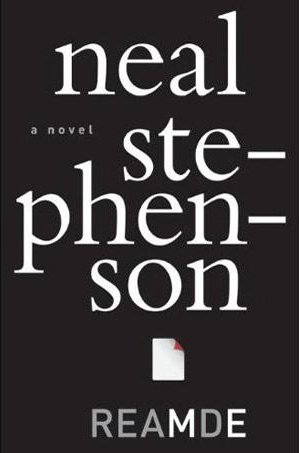Baroque, or bloated: My review of the new Neal Stephenson novel "REAMDE"
 [Originally appeared in the Boston Globe]
[Originally appeared in the Boston Globe]
BOOK REVIEW
Techno thrills and gunplay, spelled out in great detail
Neal Stephenson’s “Reamde’’ opens with a target practice session at the Forthrast clan’s annual Thanksgiving gathering. Various firearms - shotguns, Glocks, assault rifles - are discharged into an Iowa pasture. Fun for the whole family.
The spasm of gunfire is prophetic. By the time Stephenson’s world-girdling novel has reached its exhaustive conclusion, countless rounds have been fired. As Stephenson notes in his acknowledgments, he required the services of a “ballistics copy editor’’ to fact-check the inner-workings of every Kalashnikov and bolt-action .22.
Stephenson is already notorious for churning out tomes sprawling in both page count and plot. But fans of his genre-blending touch that often welds historical to science fiction with a bead of cyberpunk might find themselves displeased with the ride of this narrative machine. Whereas “Snow Crash’’ and “Cryptonomicon’’ commingled code breaking, memetics, and nanotechnology with Sumerian myth, Greek philosophy, and economic theory, “Reamde,’’ set on present day planet Earth, barely traffics in such esoterica. Here, you’ll mostly find a techno-martial thriller, much in the same vein as Tom Clancy, albeit expertly crafted and often gorgeously written.
Richard is the dispassionate, outcast middle-aged brother of the Forthrast family who founded T’Rain, a World of Warcraft-like online fantasy game whose millions of devotees role-play mages and dwarves and build networks of vassals. Richard’s niece Zula, an Eritrean refugee and geoscientist, helps manage the virtual mineral deposits that players must “gold mine’’ to generate wealth. The MacGuffin? Zula’s cash-strapped, dimwit boyfriend bungles the black-market sale of stolen credit card data, which becomes corrupted by a virus called REAMDE, an anagram for “read me’’ - the file nobody reads when installing software. To restore the infected files, victims must deliver virtual ransoms to a “troll’’ (hacker), in the game. Meanwhile, bandits rob and kill these gold-ferrying avatars. Chaos rains down upon T’Rain.
When it’s determined the REAMDE hacker lives in China, the client for the data is none too pleased. That sets into motion Stephenson’s scenario tangling the fates of manifold characters: Russian mobsters, a Chinese tour guide, a British MI6 agent, a Hungarian techie, Islamic jihadists, and two Tolkienesque storytellers, among others. The action intercuts among these players who hop, skip, and jump vehicles, jets, and boats from the Pacific Northwest to China to the Rocky Mountains. Kidnappings trigger escape attempts. Plotlines collide. Bodies pile up.
This frenetic scope is tempered by Stephenson’s lingering pace. He tunes into the precise frequency of each character, how they process and remember stimuli, be they terrorist or innocent.
In one typical passage, Zula ruminates on the trauma of her capture, “shocked by how little effect it had on her, at least in the short term. She developed three hypotheses: 1. The lack of oxygen that had caused her to pass out almost immediately after she’d killed Khalid had interfered with the formation of short-term memories or whatever it was that caused people to develop posttraumatic stress disorder.’’ That’s just hypothesis number one.
Stephenson - a minimalist, he’s not - takes us deep in these warrens of thought, cause, and effect. (He resorts to awkward “exposition as dialogue’’ info dumps, too.) Moments are narrated with painstaking precision. The events of “Day 4’’ - a pitched battle among spies, mafia, extremists, and trolls, told from a kaleidoscope of perspectives - requires 200 pages. Decision tree huggers will revel in these tactics and processes; others will find the obsessive detail tedious.
Call “Reamde’’ baroque, or call it bloated. You decide.
The meat of the novel comes before the real-world gun-blazing begins: sly jabs at the war on terror, consumer culture, our online demeanor and misdemeanors, and insights into the shifts in consciousness that social and technological change have wrought. “[Y]ou kids nowadays substitute communicating for thinking, don’t you?’’, a Scotsman involved in the identity theft scheme complains. Walmart is likened to “a starship that had landed in the soybean fields,’’ and “an interdimensional portal to every other Walmart in the known universe.’’
These adroit touches may be enough to sustain readers caught in the crossfire. That said, Stephenson probably realizes that gunplay will gain the author new fans, while also losing him loyal legions of the old.
Ethan Gilsdorf, author of “Fantasy Freaks and Gaming Geeks,’’ can be reached at www.ethangilsdorf.com. ![]()